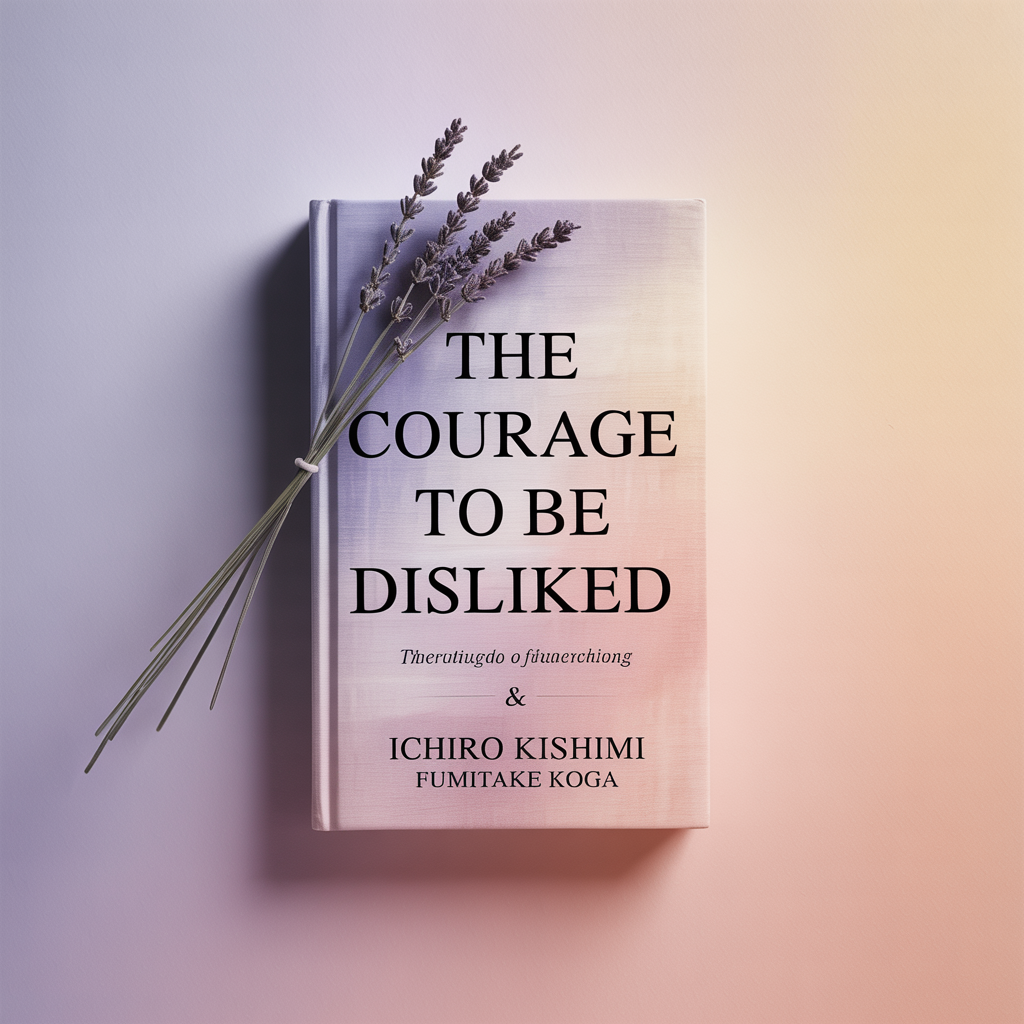If you have ever held back from sharing your art because of what people might think, or abandoned a creative project fearing it wasn’t perfect enough, then The Courage to Be Disliked might be the most important book you read this year. Based on Adlerian psychology, this groundbreaking work by Ichiro Kishimi and Fumitake Koga offers a radical perspective: true creative freedom begins when we stop seeking approval and embrace the courage to be authentic, even if it means being disliked.
For creative women, this book is more than just philosophy; it’s a practical guide to dismantling the internal barriers that hold us back. It provides the tools to overcome perfectionism, silence the inner critic, and finally permit ourselves to create freely and boldly. This isn’t just about feeling better; it’s about unlocking your true creative potential.
Disclosure: This article contains affiliate links for The Courage to Be Disliked. If you purchase through these links, I may earn a small commission at no extra cost to you. This helps support our community and allows me to continue creating content like this.
Who Wrote The Courage to Be Disliked?
To understand the book’s power, it helps to know its authors. Ichiro Kishimi is a renowned Japanese philosopher and a leading expert in classical Western philosophy, including Adlerian psychology. Fumitake Koga is an award-winning writer with a knack for making complex ideas relatable.
Together, they’ve crafted a unique dialogue-based book that has sold millions of copies worldwide. While some readers find the dialogue format between the Philosopher and the Youth challenging, I discovered it’s a powerful way to reflect on our own internal dialogues about creativity, doubt, and self-worth.
5 Key Takeaways for Creative Women
This book is a goldmine of insights, but here are five core principles that are especially transformative for women pursuing creative hobbies.
1. Your Past Doesn’t Define Your Creative Potential
A common creative block is the belief that past failures or criticisms define our abilities. Maybe a critical art teacher in your childhood convinced you that you aren’t creative. Adlerian psychology teaches that our past doesn’t determine our future. We are not defined by our traumas but by the meaning we give them.
- Practical Application: The next time you think, I am not good at this, recognize that thought for what it is: a story you’re telling yourself, not an unchangeable truth. You have the power to write a new one, starting today.
2. Separate Your Tasks from Others’
This is perhaps the most liberating concept in the book. Adlerian psychology introduces the separation of tasks, understanding what your responsibility is and what is not.
- Your Task: To create authentically, to pour your heart into your work, and to share it if you choose.
- Their Task: How they react to it. Whether they love it, hate it, or ignore it is their task, not yours. It belongs to them.
In our FemmeHobbies community, members who implemented this separation of tasks reported a significant increase in their creative output because the fear of judgment no longer paralyzed them.
- Actionable Tip: Before posting your next creation, remind yourself: ‘My job was to create this.’ Their reaction is their journey.
3. Move from People-Pleasing to Purpose-Creating
Many creative women struggle with perfectionism. But what if perfectionism is just people-pleasing in disguise? We polish and tweak endlessly, not just to meet our own standards, but to avoid any possible criticism from others. We want our work to be so flawless that no one could dislike it.
The book teaches that seeking recognition will ultimately restrict your freedom, instead of creating to please, create with purpose. Your purpose could be self-expression, learning a new skill, or simply the joy of the process. When you’re aligned with your purpose, external validation becomes secondary.
4. Choose Self-Acceptance Over Self-Affirmation
Positive affirmations can feel hollow if you don’t truly believe them. Instead of telling yourself, I’m an amazing artist, while your inner critic screams, Liar!, Adlerian psychology encourages self-acceptance.
Self-acceptance means acknowledging where you are right now, without judgment. It’s about saying, I am a painter who is still learning, and that’s okay. According to a poll in our community, 87% of our members reported reduced creative anxiety with this mindset shift. It replaces the pressure to be perfect with the permission to be a work-in-progress.
5. Find Community Without Losing Yourself
Creative communities are wonderful, but they can also be a breeding ground for comparison and pressure to conform. How do you engage with feedback and trends while staying true to your unique voice?
The key is to maintain your separation of tasks. Use what is helpful, and leave the rest. One practical strategy is the 80/20 rule of creative feedback: listen to the 20% of feedback that genuinely helps you grow and aligns with your vision, and respectfully disregard the 80% that is simply someone else’s opinion.
The Courage to Be Disliked: Quick Summary for Creators
- Core Idea: Your happiness and creative freedom are in your hands. Stop seeking approval and start living authentically.
- Key Concept: Separation of tasks. Focus on what you can control (your creative process) and let go of what you can’t (others’ reactions).
- Main Takeaway: Your past doesn’t define you. Perfectionism often hides behind people-pleasing. Self-acceptance gives you more strength than self-affirmation.
The Courage of a Creative Woman
The message of The Courage to Be Disliked is especially vital for women. Many of us are conditioned from a young age to be nice, agreeable, and accommodating. This nice girl conditioning can be poison to our creative lives. It makes us afraid to create anything bold, unconventional, or polarizing. We fear that if our art is disliked, we will be disliked.
Breaking free from this conditioning is an act of courage. It means permitting yourself to take up space, to have a distinct voice, and to create for yourself first.
Your 7-Day Courage Challenge for Creators
Ready to put these ideas into practice? Try this one-week challenge designed to build your creative courage.
- Day 1: Create Something Bad on Purpose. Make a piece of art with the sole intention of it being messy, imperfect, and wrong. The goal is to break the chains of perfectionism.
- Day 2: Share Unfinished Work. Show a work-in-progress to one trusted person. Normalize the messy middle.
- Day 3: Say No. Decline a creative request or collaboration that doesn’t excite you or align with your goals.
- Day 4: Create Without Sharing. Make something just for you. Don’t post it on social media. Reconnect with the joy of private creation.
- Day 5: Try Something New. Pick up a medium you’re a total beginner at. Embrace the freedom of having no expectations.
- Day 6: Quit a Project. Permit yourself to abandon a creative project that no longer brings you joy. It’s not failure; it’s reallocation of your energy.
- Day 7: Define Your Own Success. Write down what creative success looks like for you, without any external metrics like likes or sales.
Powerful Quotes from The Courage to Be Disliked
Here are five quotes from the book and how they apply to your creative journey:
- Freedom is to be disliked by other people.
- Creative Interpretation: Your creative freedom begins where your fear of being disliked ends. The moment you stop worrying about what others think is the moment you can create authentically.
- All problems are interpersonal relationship problems.
- Creative Interpretation: Creative block, perfectionism, and impostor syndrome often stem from a fear of how our work will be received by others. Heal your relationship with your audience by separating your tasks.
- It is you who is choosing your own life.
- Creative Interpretation: You are not uncreative because of your past. You are choosing to believe that story. Today, you can choose a new one.
- If I am not interested in your tasks, then you are not interested in mine either.
- Creative Interpretation: This is the heart of the separation of tasks. Your creative work is your task. How someone feels about it is theirs. Don’t meddle in their tasks.
- The courage to be happy also includes the courage to be disliked.
- Creative Interpretation: The joy of authentic creation requires the bravery to accept that not everyone will love what you do, and that’s perfectly okay.
Embrace Your Creative Courage
Reading The Courage to Be Disliked is the first step. The next step is putting its principles into practice, surrounded by others who are on the same journey. True creative transformation happens when we move from theory to action.
Ready to embrace your creative courage? Join our Courageous Creators circle within the FemmeHobbies community, where we practice these principles together in a supportive space. Download your free Courage Starter Kit, complete with journal prompts and a tracker for the 7-day challenge, and start your journey today.

